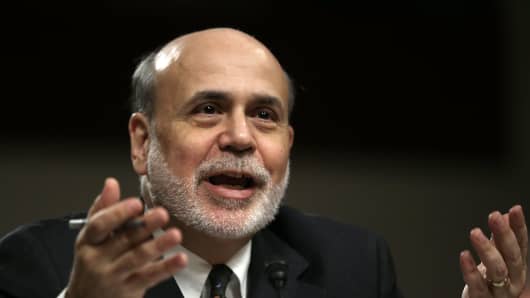That's what Scott Sumner, the word's most famous expounder of the nominal-growth targeting Market Monetarist school of economics, seems to be saying in his recent post.
Despite the current round of austerity, growth this year (partly due to QE3) is so strong that the Fed is considering tightening monetary policy. Now let me emphasize that I don't think growth is very strong this year, and I oppose tightening monetary policy. But it doesn't matter what I think, and I'm not even sure it matters what Bernanke thinks. It matters what the Fed thinks. And if they are strongly considering tightening monetary policy under current conditions, just imagine what they'd be doing if Congress was actually doing fiscal stimulus right now!
Shorter Sumner: Fiscal stimulus would crowd out monetary stimulus.
Would this be a good thing or a bad thing? The answer depends on whether you think an accommodative monetary policy or an accommodative fiscal policy would be more effective at strengthening the economy.
It's important to note here that we're not talking about anything mechanical. Higher levels of deficit spending do not automatically "push up interest rates." The Fed sets short term rates, and long term rates follow the expected path of short term rates. Rates rise and monetary policy tightens either because the Fed sets rates higher or the market expects to set rates higher.
(Read More: Wagging the Dog: Why the Fed Fears Wall Street)
This means that the tightening predicted by Sumner happens only if the Fed wants it to happen or if the market believes the Fed will react that way. A Fed that believes greater fiscal stimulus should accompany accommodative monetary policy in our current economic situation could make it clear that it won't raise rates in reaction to looser fiscal policy.
It's noteworthy that this is not what the Fed has been doing. Instead, the statements from Bernanke and the FOMC imply the opposite: that monetary policy remains accommodative because fiscal policy is restraining growth. The corollary of this is that if fiscal policy stopped being a drag, monetary policy would tighten. So the Fed itself seems to be saying that it would tighten policy if fiscal policy became more stimulative.
(Read More: Ignore the Inflation Hawks, Focus on Bernanke)
This brings us right back to what is actually the most important economic question of our time: Would fiscal accommodation be more effective than monetary accommodation?
A related question that must also be asked in this context: Which set of policies creates the greatest economic risk? Fiscal accommodation runs the risk of ever-growing deficits since new spending is notoriously hard to pare back and tax cuts difficult to reverse. Recently, however, we seemed to have developed the political technology to overcome this through automatic sequester. Monetary accommodation runs the risk of high inflation—but that risk seems far smaller than most people believed just a few years ago.
There's a final position that should be considered here—that of Richard Fisher, president of the Dallas Fed. Fisher recently argued that the reason fiscal policy has been restraining growth is not that it is too tight. Rather, he said in a speech to the National Association for Business Economics on May 16, that a regulatory regime that is too burdensome combined with the lack of a roadmap to "fiscal rectitude" is what is restraining growth and limiting the effectiveness of monetary policy. Fear of higher health care costs, inflation, compliance costs and taxes is the problem, Fisher argued.
Because of this four-part cocktail of fear and uncertainty, both monetary and fiscal policy have become ineffective, according to Fisher.
"Even if the arguments of those who wish for greater fiscal stimulus prevail, expansion in government purchases will have reduced effectiveness if it is thought that those purchases will be financed with higher future marginal tax rates," Fisher said.
This raises the question of congressional credibility. Monetary policy wonks often debate whether the Fed can credibly commit to higher growth policies without risking its credibility on containing inflation. If Fisher is right, the more appropriate question is whether Congress and the president can do this? Is there anyway Congress can reassure market actors that it won't let health care costs, regulatory compliance costs, and taxes rise without engaging in so much deficit spending that inflation becomes a primary concern?
If you're feeling cynical about Congress right now, the monetarist position is perhaps the only one offering real hope. If monetary policy works and will remain accommodative so long as Congress remains stalled on fiscal policy, monetarism offers a glimmer of hope for future growth.
Which brings us back to the dominant narrative and a warning about its possible destructiveness. If the Fed becomes convinced that monetary accommodation is "enabling" fiscal irresponsibility, some Fed policymakers could become convinced that they need to tighten to spur fiscal action. If that worked—and fiscal policy is effective—huzzah! But if it failed—if the Fed tightened while fiscal policy remained stalled—we could witness the greatest economic miscalculation since the Great Depression.



